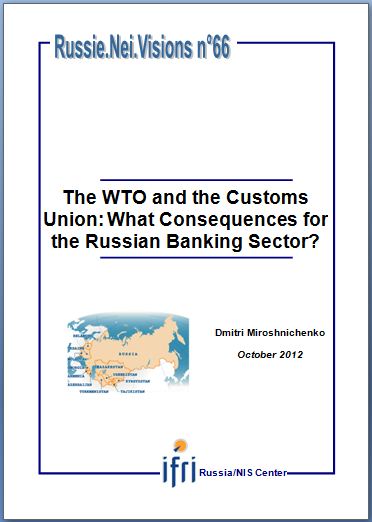The WTO and the Customs Union: What Consequences for the Russian Banking Sector?

Russia is now a member of World Trade Organization (WTO) and of the Eurasian Customs Union between Russia, Belarus and Kazakhstan. Questions remain over how this new global and regional integration will affect the competitive environment of the Russian banking services industry.
This paper shows that the mere entry of Russia into the WTO will not cause significant additional growth in the inflow of foreign investment into the Russian banking system. Changes in the structure of the Russian economy will lead to bankruptcy of some banks that are unable to diversify their business sufficiently. Credit institutions that do not have state backing or strong business clientele will have to find new niches associated with the sale of banking services to less well-off segments of the population.
An earlier version of this paper was presented at a conference organized by Ifri in the framework of the Eurasian Trade Task Force (ETTF), 31 May 2012. The ETTF addresses the different commercial and economic integration projects in Eurasia and their impact on domestic and foreign policies of the states concerned.
Download the full analysis
This page contains only a summary of our work. If you would like to have access to all the information from our research on the subject, you can download the full version in PDF format.
The WTO and the Customs Union: What Consequences for the Russian Banking Sector?
Related centers and programs
Discover our other research centers and programsFind out more
Discover all our analysesRussia's Asia Strategy: Bolstering the Eagle's Eastern Wing
Among Russia’s strategic priorities, Asia traditionally played a secondary role compared to the West. In the mid-1990s, then Foreign Minister Yevgeny Primakov initiated a rapprochement with China and India. Then, in 2014, deteriorating relations between Russia and the West prompted Moscow to begin its “great pivot to the East”.
Kazakhstan After the Double Shock of 2022: Political, Economic and Military Consequences
The year 2022 represented a dual shock for Kazakhstan. In January, the country faced its most severe political crisis since independence, followed in February by Russia’s full-scale invasion of Ukraine, which cast uncertainty over the borders of post-Soviet states. These consecutive crises profoundly shaped Kazakhstan’s domestic and foreign policy.

How the Russian Army Changed its Concept of War, 1993-2022
The traditional and high-intensity war that has occurred in Ukraine since Russia decided to invade raises a key issue: did post-soviet Russian strategic thought really prepare Russia for waging this war?
Russia's Nuclear Deterrence Put to the Test by the War in Ukraine
From the outset of its “special military operation” (SVO) against Ukraine on February 24, 2022, Russia, which possesses one of the world’s largest nuclear arsenals, has adopted aggressive deterrence measures and a resolutely menacing rhetorical stance.











